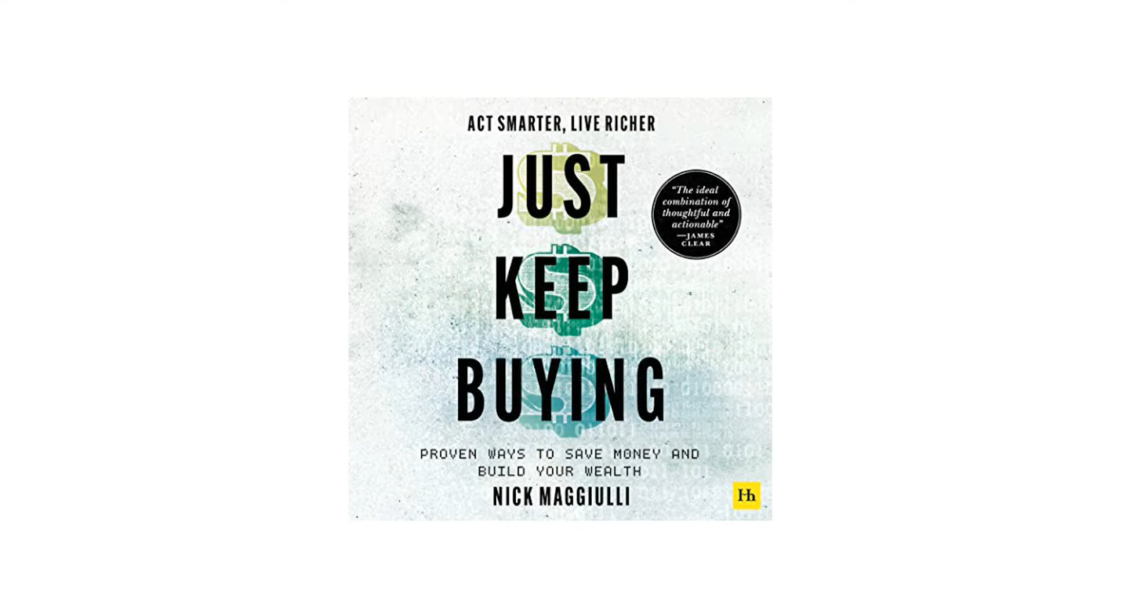Just Keep Buying, a book focused on personal finance and investment strategies, has garnered significant attention in the finance community. The book offers insights into how individuals can optimize their financial decisions for long-term prosperity. Here’s an in-depth review and analysis of the key insights and advice from the book. Also, let’s turn our attention to a review of the empowering financial wisdom found in “Do It Today.”
Overview of ‘Just Keep Buying’
Penned by Nick Maggiulli, ‘Just Keep Buying’ offers its readers a thorough discussion on prudent investment and efficient saving strategies. As you navigate through the pages, you’ll gain insights into the importance of diversifying your financial portfolio, underscoring the risk of putting all your eggs in one basket. By the time you finish the book, the author seeks to inspire confidence in the power of investing as a core component of wealth creation.
Comprehensive Evaluation: ‘Just Keep Buying’
While the book reiterates successful strategies for wealth accumulation, seasoned financiers may not find novel methodologies to apply to their current investment practices. This might be the case for individuals who have previously encountered finance literature such as ‘Rich Dad, Poor Dad’, or ‘The Psychology of Money’. Nevertheless, if you’re a novice in the world of finance, then the teachings of ‘Just Keep Buying’ could prove invaluable.
Breakdown of Content

The thematic content of the book is bifurcated into two main segments – Saving and Investing. These areas cover a plethora of topics such as:
| Saving | Investing |
|---|---|
| How Much Should You Save? | Why Should You Invest? |
| How to Save More | What Should You Invest In? |
| How to Spend Money Guilt-Free | Why You Shouldn’t Buy Individual Stocks |
| How Much Lifestyle Creep is Okay? | How Soon Should You Invest? |
| Should You Ever Go into Debt? | Why You Shouldn’t Wait to Buy the Dip |
| Should You Rent or Should You Buy? | Why Investing Depends on Luck |
| How to Save for a Down Payment (and Other Big Purchases) | Why You Shouldn’t Fear Volatility |
| When Can You Retire? | How to Buy During a Crisis |
| When Should You Sell? | |
| Where Should You Invest? | |
| Why You Will Never Feel Rich | |
| The Most Important Asset |
Here’s a more detailed overview of the topics covered:
Savings
- Implications of Lifestyle Creep: Analyzing how increasing expenses as one’s income grows can impact long-term savings;
- Tips for Guilt-Free Spending: Strategies to enjoy the present while still being financially responsible;
- Merits of Renting vs Buying: A comprehensive look at the pros and cons of renting and buying property, helping you make an informed decision based on your personal and financial situation;
- Effective Ways to Save More: Practical tips and strategies to enhance your savings without compromising your quality of life;
- Strategies for Saving for Big Purchases: Insights into planning and saving for significant expenses like a down payment for a house;
- Navigating Debt: Understanding when taking on debt might be beneficial and how to manage it effectively;
- Retirement Planning: Guidance on when and how to start preparing for retirement to ensure financial security in later years.
Investing
- Investment Avenues Recommendations: Exploring various investment options and how to choose what best suits your financial goals;
- Understanding Stock Market Volatility: Insights into navigating the ups and downs of the stock market and how to maintain a resilient investment strategy;
- Buying During a Crisis: Tips on how to approach investing during economic downturns or market crises;
- The Role of Luck in Investing: Examining the extent to which luck plays a part in investment success and how to mitigate its impact;
- Debunking the Myth of Timing the Market: Why waiting for the perfect moment to invest might be less effective than consistent, long-term investing;
- Individual Stocks vs Diversification: Evaluating the risks and rewards of investing in individual stocks versus a diversified portfolio;
- Investing Myths and Misconceptions: Dispelling common investing myths and offering a more realistic perspective on wealth accumulation.
Learning to Invest Effectively
Institutional teachings about investment strategies may not be commonplace in many cultures, including India. It is common for many to learn about investment options from self-study or through experiences of trial and error. The book alleviates these challenges by illustrating a simple investment strategy that can be customized based on individual comfort and financial goals.
By partitioning your income into necessities, investments, luxury, and emergency savings, you can create a robust financial plan that caters to all aspects of your life. ‘Just Keep Buying’ advises readers to progressively increase their investment amounts over time, as their comfort level and understanding of the markets grow.
The Key to Managing Expenses
Controlling expenses is a crucial aspect of effective money management. While it’s easy to assume that reducing expenses is the only way to save more, the author enlightens readers about the importance of diversifying income streams.
Establishing a secondary source of income through options such as online entrepreneurship, content creation on platforms like YouTube, or selling products online, can significantly buoy your overall financial stability. With the advent of the digital age, the possibilities for side gigs are virtually endless.
When is the Right Time to Invest?
Market timing is a topic that sparks much debate among financial pundits. Yet, ‘Just Keep Buying’ simplifies this complex issue. Whether it’s the stock market or the crypto market, the book encourages readers to invest regularly, regardless of market conditions. It fosters the mindset of buying low and selling high and emphasizes the importance of patience to navigate through market volatility.
Understanding the Nuances of Debt

Debt can be a double-edged sword. Knowing when to leverage it and when to avoid it can make a monumental difference in your financial journey. The author illustrates this point by differentiating between “good” debt (such as for a new business) and “bad” debt (like buying a high-end smartphone on EMI). The key takeaway? Only take on debt for assets that appreciate in value or generate income.
A Critical Review of ‘Just Keep Buying Book’
Although the book offers a wealth of knowledge, it fails to deliver any groundbreaking insights into the field of finance and investment.
For individuals looking for fresh financial perspectives, exploring other books in the genre would be more beneficial. Books such as ‘The Intelligent Investor’ or ‘The Little Book of Common Sense Investing’ offer enlightening and innovative investment strategies.
While ‘Just Keep Buying’ provides valuable financial education, particularly for novices in the field, seasoned investors might find it a bit redundant. Other books in the finance genre may provide more innovative techniques and sophisticated strategies for experienced investors. Whether or not to read ‘Just Keep Buying’ ultimately depends on your current financial knowledge and goals.
Conclusion
In conclusion, ‘Just Keep Buying’ offers a wealth of practical advice and knowledge for those new to the world of finance and investment. Despite its lack of innovative insights, it effectively simplifies the complex world of financial management, making it an ideal starter book for novices. However, for more experienced investors seeking novel strategies and deeper insights, exploring other finance books might be a better option. Regardless, the teachings from this book should not be entirely dismissed, as they reinforce the foundation of well-established financial wisdom.
